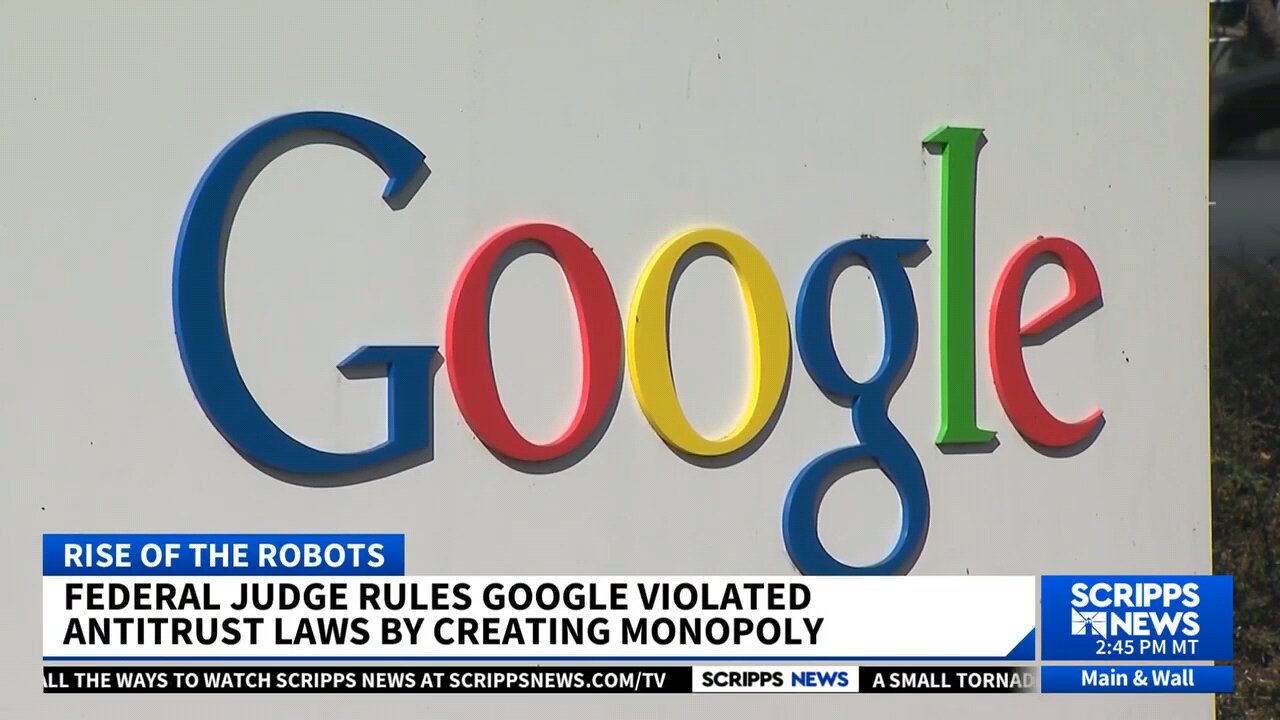Premium Only Content

🚨 FEDERAL JUDGE RULES GOOGLE VIOLATED ANTITRUST LAWS BY CREATING MONOPOLY
A US judge ruled that Google built an illegal monopoly. What happens next?
The ruling found Google broke antitrust laws by making multibillion-dollar deals. Will those agreements evaporate?
Nick Robins-Early
Tue 6 Aug 2024 17.25 EDT
Share on FacebookShare on TwitterShare via Email
Google lost its landmark antitrust case against the US Department of Justice this week after a federal judge ruled the tech giant had built an illegal monopoly over the online search and advertising industry. The decision will probably have immense implications for both Google’s internal operations and how people interact with the most popular page on the internet.
Judge Amit Mehta’s ruling specifically found that Google broke antitrust laws by striking exclusive agreements with device makers like Apple and Samsung, in which Google would pay billions of dollars to ensure that its product was the default search engine on their phones and tablets. During the trial, it was revealed that Google paid companies, including Apple, more than $26bn in 2021 alone to remain the default option for search in Safari. Those deals allowed Google to build a monopoly over search and unfairly suppress competition, Mehta found.
What happens next will determine whether Google is forced to make sweeping changes to how it does business or whether it can successfully defang the ruling on appeal. As that fight begins to ramp up, it will have broader consequences for how regulators seek to rein in big tech companies and break up other alleged monopolies.
Google broke law to maintain online search monopoly, US judge rules
Here’s what to expect following the decision.
Google could be forced to change search
The ruling in US v Google does not contain any remedies for the company’s illegal monopolization of the internet search industry, and the justice department didn’t seek specific penalties when it argued the case. Mehta will hold a separate trial – start date as yet unspecified – to determine what remedies the government should enforce against Google, which could range from tweaks to how it handles contracts to breaking up the company entirely.
Since much of the decision revolves around Google’s default search agreements, one possible outcome is that Mehta rules the company can no longer make such deals. This would allow Google to remain the default search engine if device makers opt for it, but would block the multibillion-dollar payments Google has made to guarantee that status. Apple and Samsung did not immediately respond to requests for comment. Mozilla, whose Firefox browser defaults to Google for search, receives 86% of its revenue– roughly $510m of a total $593m – from Google’s search payments, per Fortune magazine.
Mozilla said in a statement, “We’re closely reviewing the court’s decision, considering its potential impact on Mozilla and how we can positively influence the next steps. The Court did not determine a remedy.”
Another result could look like what has been playing out in Europe since regulators there began forcing businesses to comply with its Digital Markets Act. When users log on to a service from tech companies like Google, Apple or Microsoft, they face a “choice screen” where they are prompted to select which browser they would like to use.
The curious case of Epic Games: how the developer beat Google but not Apple
In what would be the most aggressive choice of ruling, Mehta could also decide that Google’s illegal monopoly necessitates that the company sever services like search from the rest of the company entirely. He could also levy fines or target other parts of Google’s business that contribute to its antitrust violations.
Google plans to appeal the ruling
However Mehta decides to sanction Google, it is unlikely that users will see immediate changes to its major services. Google has not accepted the court’s ruling and has declared it will appeal, setting up yet another legal battle with the justice department and delaying any consequences that the company may face.
The company’s defense throughout the trial was that its industry dominance is the result of producing a better product than its competitors, and it reiterated that argument on Monday following its loss.
“This decision recognizes Google offers the best search engine, but concludes that we shouldn’t be allowed to make it easily available,” Kent Walker, Google’s president of global affairs, said in a statement that included quotes from the ruling describing Google’s search as superior to its rivals.
Has Google’s monopoly on the search engine market finally timed out? | John Naughton
There is precedent for a big tech company successfully watering down antitrust violations. After the justice department successfully argued that Microsoft was operating as an illegal monopoly – a case frequently compared with Google’s case – a federal judge ruled in 2000 that parts of the company should be broken up. Microsoft appealed, and only two years later had won a series of victories that overturned key aspects of the decision and lessened its consequences. The justice department and Microsoft ultimately reached a settlement in 2002 that put a few restrictions on its business practices but kept the company mostly intact.
A Google spokesperson declined to provide a timeline for the appeal or further information on the company’s response to the ruling.
Another antitrust suit is looming
While Google formulates a response to losing the case, the company is also preparing for another justice department lawsuit aimed at its digital advertising practices. The lawsuit alleges that Google has built a monopoly over online advertising, stating that its dominance forces companies to use its technology and stifles competition.
The second lawsuit threatens one of the core pillars of Google’s revenue model. The company’s advertising division controls more than a quarter of US digital ads and generates tens of billions of dollars for the company each year.
Google has denied the justice department’s allegations and accused it of trying to pick favorites in a competitive market. Originally filed in 2023, the case is set to go to trial in September.
-
 2:39:16
2:39:16
TimcastIRL
6 hours agoDemocrat CAUGHT ON TAPE ADMITTING To Corruption, CHEATING ON WIFE Says Nick Sortor | Timcast IRL
151K33 -

Man in America
12 hours agoTrump to BAN the COVID Vaxx?! mRNA in Your Organic Meat?! w/ Kim Bright
51.8K2 -
 57:42
57:42
Flyover Conservatives
1 day agoThe Great Gold Cover-Up: Is Fort Knox EMPTY?! - Clay Clark + Dr. Kirk Elliott | FOC Show
22.2K6 -
 1:24:40
1:24:40
Kim Iversen
9 hours agoJeffrey Sachs Just Exposed the Truth They Don’t Want You to Hear
58.8K39 -
 2:11:32
2:11:32
Glenn Greenwald
7 hours agoGlenn From Moscow: Russia Reacts to Trump; Michael Tracey Debates Ukraine War | SYSTEM UPDATE #413
53.2K74 -

Slightly Offensive
7 hours ago $0.81 earnedGOV. RAMASWAMY? Vivek to import 1 BILLION INDIANS to OHIO | Nightly Offensive
65K42 -
 4:51:08
4:51:08
Wahzdee
11 hours agoSniper Elite Then Extraction Games—No Rage Challenge! 🎮🔥 - Tuesday Solos
64.5K3 -
 2:12:58
2:12:58
Robert Gouveia
10 hours agoSenator's Wife EXPOSED! Special Counsel ATTACKS; AP News BLOWN OUT
97.4K61 -
 55:07
55:07
LFA TV
1 day agoDefending the Indefensible | TRUMPET DAILY 2.25.25 7PM
51.6K14 -
 6:09:26
6:09:26
Barry Cunningham
16 hours agoTRUMP DAILY BRIEFING - WATCH WHITE HOUSE PRESS CONFERENCE LIVE! EXECUTIVE ORDERS AND MORE!
86K50